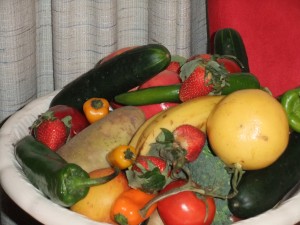
If you’re concerned about the environment, then one of the best things you can do to help is stop eating animal products.
Farm animals take up a lot of land. 30% of the world’s land is used to raise farm animals. We don’t have that much cleared space available. So farmers are clearing land to make more room for farm animals. 70% of Amazon deforestation was caused by people clearing land for farm animals. And it’s not an efficient use of the land either. If a farmer has a 2.5 acre farm, he can either feed 30 people with vegetables or fewer than 10 people with meat.
Farm animals need a lot of water. They drink a lot. They also eat plants, which need to be watered. It takes 15 times more water to make a pound of meat than it does to make a pound of soy.
Farm animals produce a lot of gas. That gas (methane and carbon dioxide) means increased greenhouse gases. And that means climate change. At least 51% of global gas emissions are caused by animal agriculture.
Farm animals produce a lot of urine and feces. Urine and feces are breeding grounds for mold and bacteria. A lot of that urine, feces, mold, and bacteria ends up in our water supply when it runs off from the farm. According to the Environmental Protection Agency (EPA), farm animals are the #1 cause of water pollution. When large amounts of animal feces get into the water, the algae population increases. When the algae population increases, not enough oxygen is left in the water for other forms of life and they die. There is now one such dead-zone where the Mississippi River meets the Gulf of Mexico due to farm animal runoff. The dead-zone is 6,000-7,000 square miles. According to Princeton University, we can fix it if we stop eating animal products.
At this point a lot of people say, “But even if I stop eating meat, the farm animals will still be there. So if I stop eating meat, that won’t change anything.” It’s true that if we all went vegan today, those farm animals would still be here today. And tomorrow too. But the point is that people would stop breeding more. Right now, farm animals don’t breed as often as farmers would like. So a lot of farmers use artificial insemination to make sure their animals breed as often as physically possible. If we all stopped eating animal products, that kind of stuff would stop. Farm animal populations would decrease more and more over time as we stop forcing them to breed.
At this point a lot of people say, “Why do you hate farm animals? Why do you want them to go extinct?” I don’t hate farm animals. They’re bad for the environment only because we make them bad for the environment by having too many of them. I don’t want them to go extinct, and they wouldn’t go extinct. Not any time soon anyway. Without factory farms that are full of animals and continually pumping out even more, farm animal populations would certainly go down. But there will always be some people with some land who want some farm animal pets.
And at this point a lot of people say, “Who would want a farm animal for a pet!?” Cows actually make great pets, if you’ve got the room for one. They’re intelligent, trainable, and can live close to 25 years. They can help plow. The long-haired varieties can be brushed, and things can be knitted with their loose hair. And their feces is a good natural fertilizer, when used in far smaller quantities than cow farms pump it out. Sheep are friendly, don’t require much time, can keep your lawn trimmed, and can produce wool (some sheep need to be sheared in the summer in order to keep cool, comfortable, and clean; if you don’t want to deal with shearing the sheep, look for a hair variety rather than a wool variety). Chickens are small, pretty, can be diapered and brought in the house (yes, I am serious, they do sell chicken diapers), eat kitchen scraps, eat garden pests, fertilize your garden as they walk through it, and they’re low maintenance. Pigs are very smart (they’re one of the top 5 smartest animals in the world, and some are even trained to sniff out drugs for the police department), social, clean, cuddly, don’t chew things like puppies do, and live longer than the average dog.
So stop eating animal products. If you’re not willing to stop altogether, at least cut down on the amount of animal products that you eat. A diet with little to no animal products is better for the animals, better for the environment, and even better for you (studies show that diets high in animal products are linked to heart disease, cancer, obesity, and more)!
